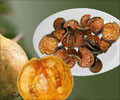A new study has found that adding a spot of milk to the black tea will not spoil the antioxidants effects of polyphenols present in it.
A new study has found that adding a spot of milk to the black tea will not spoil the antioxidants effects of polyphenols present in it.
Earlier studies have suggested that milk can ruin the beneficial properties polyphenols, found in black tea.However a team of researchers led by Janet Kyle at the University of Aberdeen, UK, carried out a study that debunks the earlier findings.
As a part of the study, researchers brewed six commercially available loose-leaf teas which produced similar amounts of polyphenols over similar timescales.
They then tested the tea that produced the most polyphenols on a group of nine healthy young men, who were given a cup or two.
The researchers served Black tea first and monitored the sample group's plasma for levels of certain polyphenols. The same thing was done after adding milk to the tea.
Based on their results they concluded that adding milk made no difference to the beneficial properties.
Advertisement
They also found that the longer the brew time, the greater the concentration of polyphenol compounds in the tea.
Advertisement
But, a Simon Langley-Evans, from the University of Nottingham, UK, who conducted a similar trial in 2000, insists that people cannot throw caution to the wind, as his study found milk completely wiped out the antioxidant properties of tea in some, but not all, of his trial subjects.
"The situation is a bit muddy at the moment, and this just adds to the mud," Nature quoted him, as saying.
He adds that a larger trial is needed to draw concrete conclusions.
Source-ANI
SRM/B











